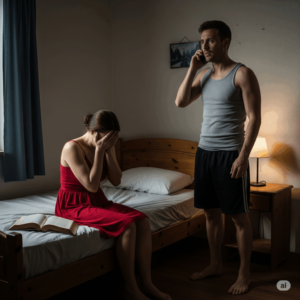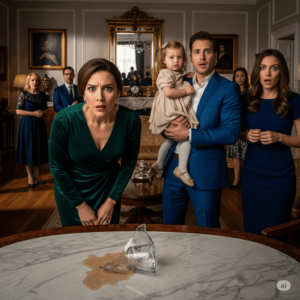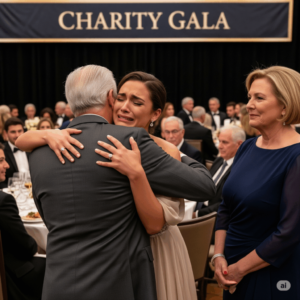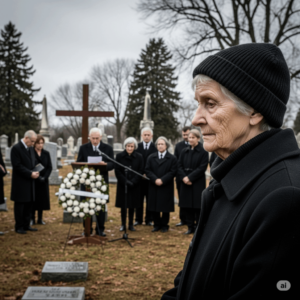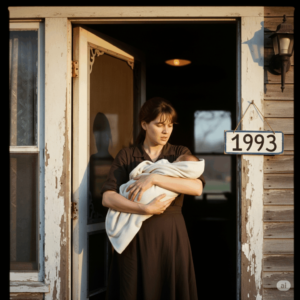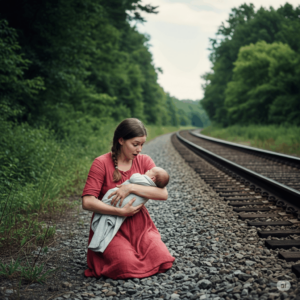My aunt burned my face with boiling water. Now I’m the one who feeds her.
EPISODE 1:
Rejoice was only eight years old when her life changed forever.
Her mother died giving birth to her baby brother, and her father — an overworked construction worker — couldn’t take care of both a newborn and a little girl. So he made a painful decision: he took the baby with him to the city and left Rejoice in the care of his late wife’s older sister.
“It will only be for a while,” he told her as he held her tiny hand. “You’ll stay with your mother’s sister. She’ll treat you like her own daughter.”
But from the moment Rejoice stepped into that house in Aba, her life became a nightmare.
Aunt Monica was a bitter woman. Her husband had left her for a younger woman, and she carried that anger every single day. Her two sons, Justin and Terry, lived comfortably—private school, fresh bread, clean clothes. But Rejoice slept on a mat by the kitchen, wore torn and used clothes, and only ate after everyone else had finished.
“Do you think you’re a princess?” Monica would yell, throwing soapy water at her. “You come into my house acting like a lady?”
Rejoice washed dishes, carried water, cooked, scrubbed bathrooms… and still got slapped nearly every day. But she never complained. At night, she would lie awake, whispering to her late mother.
“Mommy, I miss you. Why did you leave me?”
At school, she was quiet but smart. Her teacher, Mrs. Grace, often told her, “You have a gift, Rejoice. Don’t let anyone make you feel small.”
But it was hard for Rejoice to believe that. Her back bore whip scars. Her arms, burn marks. Her cheeks, bruises from Aunt Monica’s heavy rings.
One Saturday morning, everything changed.
Rejoice was cooking rice and forgot to check the pot because she was sweeping the yard. When she returned, the rice had started to burn.
When Monica walked into the kitchen and saw the pot, her eyes lit up with fury.
“Useless girl! Do you know how much rice costs in the market?”
“Auntie, I’m sorry… I didn’t mean to, I was sweeping—”
Before she could finish, Monica grabbed a kettle full of boiling water and, without hesitation, poured it directly onto Rejoice’s face.
The scream that burst from that child wasn’t just pain—it was the sound of shattered innocence.
“My face! Mommy! Mommy!” she cried, clawing at the air, rolling on the floor. Her cousins, Justin and Terry, stood frozen in horror.
“Now you’ll learn! Stupid girl!” Monica yelled as she dropped the kettle like nothing had happened.
Neighbors came running after hearing the screams. Someone called a man named Kevin, who rushed Rejoice to the nearest clinic. The nurses were horrified when they saw her.
“Who did this? This wasn’t an accident—this is boiled water! This is cruelty!”
Her face was covered in blisters and swelling. Her left eye was completely shut. Her skin was peeling off. For days, she couldn’t eat or speak properly. She flinched at loud noises, even in her sleep.
The police were called. But Monica—respected in church and well-connected—claimed it was an accident.
“She was playing in the kitchen. She spilled it on herself. God knows I love that child.”
No one believed her. But with no solid evidence, the case went nowhere.
Rejoice stopped speaking for weeks. After being discharged, she still avoided everyone’s gaze. Monica, unable to deal with the guilt—or the constant reminder of what she’d done—sent Rejoice back to the village to live with her grandmother.
Her body now bore visible scars, but the deepest ones—the ones inside—were far harder to see.
That night, sitting behind her grandmother’s kitchen and staring at the stars, Rejoice whispered:
“God… why do bad people win? Why did You let her do this to me?”
Then she added, barely audible, as if making a vow:
“One day, I won’t be poor. I’ll never beg for food again. I’ll never live in anyone’s house again.”
The first time Rejoice saw her reflection after the burns, she barely recognized herself. Her once-smooth skin was now twisted and cracked. Her left eye drooped. Her cheek looked like hardened clay. She slowly touched her face and murmured:
“Is this… me?”
There was no answer.
But the girl standing in front of that mirror would rise—scarred, but not defeated.
EPISODE 2: The Girl the World Rejected
Rejoice was only nine years old when she learned that life is not fair. The burn had stolen her face, but not her soul. And although every time she looked in the mirror the pain felt overwhelming, a tiny spark still lived inside her: hope.
For months, she lived in silence at her grandmother’s house. The old woman was poor but kind. She made neem leaf infusions to soothe Rejoice’s skin and sang her old songs each night, even though she didn’t know if her granddaughter was sleeping or silently crying in the dark.
“You’ll be alright, my child,” she would say, stroking her head. “God does not abandon the righteous. He sees you.”
But Rejoice no longer trusted a God who seemed deaf to her pleas.
People in the village looked at her with pity—or horror. Children stayed away from her as if she were cursed. At school, some whispered that her face was divine punishment. Others simply couldn’t stand to look at her. Soon, she stopped going.
One day, while walking to the well, she heard a woman whisper:
“Look at her… the burned girl. Who’s going to marry something like that?”
Rejoice tightened her grip on the rope of the bucket and kept walking. She didn’t shed a single tear. Not anymore.
Salvation came in the form of dusty books.
Her grandmother, who had been a teacher before she was widowed, kept a small box of old texts. “They’re yours, if you promise not to give up,” she said one day, blowing the dust off a novel.
Rejoice devoured them with hunger. She learned to write poetry, to read aloud in front of the mirror, to dream of a world far bigger than the one she was born into. At night, she read to her grandmother under the dim glow of a candle.
At twelve, she returned to school, head held high and her face covered with a scarf. When the teacher saw her walk in, she couldn’t help but smile warmly.
“Welcome back, Rejoice. Your seat was always here.”
The first days weren’t easy. Some classmates laughed, others whispered cruel things. But there was a girl named Zina who sat beside her without saying a word. Over time, they became inseparable.
One afternoon, after class, Zina asked her:
“Does it hurt?”
Rejoice stayed silent for a moment, then answered:
“Only when people look at me like I’m a monster.”
Zina gripped her hand tightly.
“You’re not a monster. You’re a warrior.”
At sixteen, Rejoice won a scholarship to a regional science competition. It was the first time she left the village since the accident. In the city, no one knew her story, and while some still stared out of curiosity, there was no hate, no slaps, no boiling water. Only possibilities.
She returned to the village with a bronze medal and a letter: a nonprofit organization wanted to sponsor her education all the way through university.
Her grandmother cried tears of joy.
But not everyone was happy.
One afternoon, someone knocked on her grandmother’s hut door.
It was Aunt Monica.
Dressed elegantly, as always. Her makeup flawless, her expression unreadable.
“I’ve come to take her with me,” she said. “I’m her legal guardian. And if she’s going to study in the city, it should be under my roof.”
Rejoice froze. Her grandmother pressed her lips together.
“After what you did? You have no shame!”
“There’s no proof of anything. And it was years ago. I… I made mistakes, but I want to make things right,” Monica replied, her voice forced.
Rejoice looked at her with a mix of fear and fury. But also something more: control.
She was no longer the girl sobbing in the kitchen. She was a young woman with scars, yes… but also with purpose.
“I’ll go with you,” she said slowly, “but not because I trust you. I’ll go because one day… you’ll look me in the eyes and wish you’d never laid a hand on me.”
Monica swallowed hard.
Now, years later, Rejoice is twenty-two.
She is a doctor in biotechnology. She works at a children’s hospital where burn victims find comfort in her soft voice and crooked smile. Her scarf no longer hides anything. Her face, though scarred, shines with relentless dignity.
And Monica…
Monica is bedridden, paralyzed by a stroke.
She doesn’t speak. She doesn’t walk. She only stares at the ceiling in silence.
And who feeds her? Who cleans her body and gives her medicine?
Rejoice.
Every spoonful she feeds her, every pill, every glance… is a lesson.
—“Life gives you what you sow, Aunt,” she whispers. “But I… I sowed love, even when you only gave me pain.”
EPISODE 3: The Forgiveness No One Understood
The hallway clock struck 6:00 a.m. Rejoice was already awake.
Every day began the same: she boiled water, prepared oatmeal, and crushed Aunt Monica’s pills in a mortar. Everything had to be ready before the hospital caregiver arrived. But Rejoice wasn’t a nurse at that moment. She was the niece society said should care for her aunt, even if that aunt had ruined her childhood.
She entered the room with the tray. Monica was still immobile. Her eyes—the only part of her body that could move—followed her slowly. Rejoice placed the spoon near her mouth and spoke in that calm voice no one else could imitate.
—“Good morning, Aunt. Today there’s oatmeal with banana. Do you remember how you never let me touch the fruit because it was only for Justin?”
Monica, as always, said nothing. But sometimes, Rejoice could swear she saw a tear roll down her cheek.
At the hospital, Rejoice was someone else. She wore a white coat and a smile that even the most wounded children felt like a balm. One five-year-old boy, his hands badly burned, once asked her:
—“Doctor, did you get burned too?”
Rejoice nodded, kneeling to his level.
—“Yes. It hurt a lot. But it also made me strong.”
The boy looked at her with wide eyes, awestruck.
—“Then… will I be strong too?”
—“Stronger than me, little one. Much stronger.”
One Sunday afternoon, while organizing documents from a research project on tissue regeneration, Rejoice found an old box in the corner of the closet. It belonged to her grandmother, who had passed away two years earlier. Inside were letters, photos, a worn Bible… and a small note written in trembling handwriting:
“My daughter Rejoice, if the pain ever overwhelms you, do not repay evil with evil. God did not ask you for justice. He asked you for purpose.”
Rejoice closed her eyes. She remembered the nights on the mat, the cold soups, the silent tears… and her promise: “I will never live under anyone’s roof again.”
She had made it. But something inside her was still broken. Not because of the scars. But because, deep down, part of her still longed for something Monica would never say: “I’m sorry.”
A week later, Rejoice was urgently called to the hospital. Monica had suffered a second stroke. She could no longer move her eyes. She was barely breathing.
The doctors were clear: “She might not make it through the night.”
Rejoice sat beside her bed. She took her aunt’s limp hand and spoke for the last time.
—“You stole my childhood. You stole my face. But you didn’t steal my soul. Every day I fed you was an act of war against hate. And I won.”
Tears streamed down her face now. Her voice trembled, not with fear, but with release.
—“And for that… even if no one understands it… I forgive you.”
A long beep broke the silence.
Monica had died.
The funeral was quiet. No one cried much. Some came out of respect, others out of habit. Rejoice, dressed in white, stood tall the entire time. Some whispered among themselves:
—“Why did she do so much for that woman?”
—“I couldn’t have.”
—“She must be crazy.”
But Rejoice didn’t hear any of it.
She had buried her aunt. But more than that, she had buried the resentment.
Today, at twenty-five, Rejoice runs a care center for child abuse victims.
She named it Casa Estrella — after the stars she used to watch as a child, crying behind her grandmother’s kitchen.
Every child who walks through that door receives not just medical care, but something she herself had been denied for years: tenderness.
—“You are not what they did to you. You are what you choose to become,” she tells them.
And when someone asks her about her face, she simply smiles.
—“These marks are not my shame. They are my story.”
EPISODE 4: When Scars Speak
The sun fell gently over the rooftops of Aba. It was an ordinary day for most. But for Rejoice, it was the beginning of something different.
For the first time in many years, she returned to the house where it all began.
Yes. Aunt Monica’s house.
The property had been abandoned since Monica’s death. Justin had moved abroad and never looked back, and Terry now lived in Lagos. No one claimed the house. No one even wanted to touch it.
But Rejoice did.
With the old rusty keys, she opened the gate that had once filled her with fear. The metallic screech sounded like an old ghost awakening.
She walked slowly through the yard. Everything was overgrown and dusty. The smell of dampness, mixed with memories, hit her chest.
The kitchen.
She stood in front of that door for several minutes. That corner where her face had changed forever… now was just an empty space, with a forgotten pot still sitting on a burner.
She closed her eyes.
She heard the echoes of screams, insults, pain. But she also remembered the little girl who, even shattered, kept breathing. And she decided to do something unthinkable.
Two months later, Aunt Monica’s old house was no longer the same.
Where once there were screams, now there were laughter. Where there was fear, now there were games.
Rejoice had turned it into a shelter for abused girls.
She named it The House of Hope.
On the first day it opened, only three girls arrived. One, Blessing, had a wound on her back that was still oozing. Another, Amaka, hadn’t spoken a word in two weeks. The third, Kemi, had a gaze so empty it gave chills.
Rejoice welcomed them with a smile.
—“Welcome to your home. Here, no one will yell at you. No one will hit you. And no one will ever dim your light.”
The girls said nothing. But that night, Kemi approached her and gently touched her face.
—“Were you like us too?”
Rejoice nodded, holding back tears.
—“Yes. And I still am.”
With time, the shelter grew. Volunteers arrived. Psychologists. Donors. Rejoice began receiving invitations to conferences, television programs—to share her story.
One afternoon, during a university talk, a young woman in the audience raised her hand and asked:
—Would you forgive someone who destroyed your life?
There was a long silence.
Then, Rejoice answered firmly:
—Forgiveness doesn’t mean forgetting. It means choosing not to let the past control your future. Yes, my aunt hurt me. But if I hadn’t forgiven her, I would still be her prisoner—even after her death.
The room fell silent. Some applauded. Others cried.
And in a corner, one figure watched with teary eyes: Zina, the friend who had never left her side.
One day, while walking through the market, an older woman approached her. She wore a veil and walked with difficulty.
—Is it you… Rejoice?
She nodded, not recognizing her.
The woman slowly removed her veil.
It was Mónica’s mother.
—I… I knew what my daughter did to you. I knew everything. And I never did anything. —Her voice trembled—. I always thought it was a family matter. But now I see… my silence was cowardice.
Rejoice said nothing.
The woman knelt before her, right there in the middle of the market.
—Forgive me, my child. For not defending you. For letting you grow up in the shadows.
People stared. They whispered.
But Rejoice gently lifted her.
—You don’t have to kneel. The wound has already healed. And if it ever bleeds again… I have clean hands to tend to it.
That night, back at the shelter, Rejoice sat with the girls in the yard, under the stars.
—Do you know what my grandmother used to tell me? —she asked—. That when the world breaks you, it’s not to destroy you. It’s to show you how much you can rebuild.
Blessing, who at first couldn’t even sleep without crying, rested her head on her shoulder.
—So… can we heal?
—More than heal —Rejoice replied—. You will shine.
EPISODE 5: Light in the Darkness
The “House of Hope” had become much more than just a shelter for hurt girls—it was a symbol of resilience, healing, and future.
Rejoice walked through the rooms, watching as laughter replaced the silence that had reigned in that house for years. Blessing helped prepare dinner, Amaka was drawing for the first time in weeks, and Kemi sang a song she had written herself.
The soft sound of footsteps pulled her from her thoughts. It was Zina, the faithful friend who had always been by her side.
—Want to come with me? —Zina asked—. There’s something I want to show you.
Rejoice nodded and followed her friend to the town square, where a small crowd had gathered around an improvised stage.
An older man with a thoughtful gaze held a microphone. He was the local mayor, and just behind him, a huge banner read: “Honoring Rejoice: An Example of Courage and Hope.”
Rejoice’s heart pounded as she heard the mayor speak:
—Today, we honor a woman who, despite facing the cruelest of hardships, has transformed her pain into light for our whole community.
The applause was thunderous.
Rejoice climbed the stage, her scars glowing under the lights, her voice strong and clear:
—It wasn’t easy to get here. There were times I thought the darkness would consume me. But every day, I chose to fight. I chose to love, even when I was hurt. This recognition isn’t just mine—it’s for all the girls still searching for a safe place. For all those who need to know that they, too, can shine.
As she stepped down from the stage, a young girl approached her shyly.
—Dr. Rejoice, thank you for showing us that beauty lives in the soul.
Rejoice smiled, remembering her own childhood reflection—how that scarred face had become the story of her strength.
That night, at the shelter, while the girls slept, Rejoice pulled out an old box from under her bed. Inside were all the letters and photos that had accompanied her since childhood.
She wrote in a notebook:
“Today, I learned that scars don’t define who I am—they define how I rise each day. And though life burned me, I choose to heal… and to help others heal.”
She lay down, exhausted but at peace.
Because she knew the real journey was just beginning.
EPISODE 6: The Past That Won’t Be Forgotten
Although life at the “House of Hope” continued with joy and purpose, the ghosts of the past still visited Rejoice during quiet nights.
One afternoon, while reviewing documents for a new aid campaign, she received an unexpected call. On the other end, a familiar but trembling voice.
—Rejoice… it’s Justin.
Her heart skipped a beat.
Justin, her cousin who had vanished without a trace years ago, now wanted to see her.
—Why are you calling me? —she asked, holding back emotion.
—I need to talk to you. There are things I never said… and I want to try to make it right.
She agreed to meet him at a local café.
When he arrived, he looked tired—premature wrinkles, eyes full of guilt.
—I know I have no right —he began—. When my mother hurt you, I just hid. I was afraid, and I did nothing to protect you.
Rejoice looked at him without hatred.
—I wasn’t a strong girl either. But I survived. And now, I help other girls survive.
Justin nodded.
—I want to help. I want to be part of “House of Hope.”
Little by little, Justin began working with Rejoice. He repaired the house, organized events, and slowly earned the trust of the girls.
But not everything was easy.
One night, after an argument between him and his brother Terry, old family wounds reopened.
—Why do you support her? —Terry shouted—. She was never part of the family!
Justin stayed calm.
—Because she’s the family I choose now. And because I believe in her strength.
At a volunteer meeting, Rejoice addressed the group:
—Forgiveness doesn’t mean forgetting or allowing the harm to happen again. It means choosing to heal and build. Justin is here because he decided to be part of that journey. We all have the power to change.
That night, as she closed the doors of the house, she looked up at the starry sky and whispered:
—Thank you, Mama, for giving me the strength to go on. No matter how dark the path, light always finds its way.
EPISODE 7: The Awakening of Hope
The “House of Hope” was full of life. Every corner vibrated with laughter, music, and new stories of resilience. Rejoice had managed to turn that dark place into a beacon for those seeking light.
One morning, while organizing a volunteer meeting, she received an unexpected letter. It came from an international organization recognizing her work and offering financial support to expand the shelter.
The news spread quickly. For Rejoice, it was a clear sign that her mission was growing, that the scars she bore were no longer a limit, but a bridge.
However, not everything was perfect. Some people in the community still looked at her with suspicion, unable to let go of the prejudice and stigma she had carried all her life.
One night, when she returned to the shelter, she found graffiti on the wall that read: “Monster. You don’t deserve help.”
Rejoice felt the familiar pain—but this time, she didn’t let it drown her.
The next day, she gathered the girls and the volunteers.
—This isn’t just an attack on me —she said firmly—. It’s a reminder that there’s still much work to do. But every time they try to extinguish us, we light an even stronger flame.
Blessing raised her hand and said:
—Dr. Rejoice, I want to help too. I want every girl to know they can be strong, no matter what people say.
Rejoice hugged her.
—That’s right, Blessing. Together we are unstoppable.
With the help of the international organization, the House of Hope opened a new wing dedicated to emotional rehabilitation and education for victims of abuse across the region.
Rejoice was happy—but she knew her greatest triumph wasn’t the building or the funding. It was seeing each girl rise, heal, and shine with her own light.
One afternoon, while writing in her journal, she came across a sentence that summed it all up:
“Scars tell stories. Ours speak of struggle, resilience, and above all, hope.”
And that hope, now, was stronger than ever.
EPISODE 8: Rebirth and Legacy
The sun timidly rose over Aba as Rejoice walked through the expanded halls of the “House of Hope.” Now, the shelter not only welcomed girls but also offered workshops, psychological support, and a school reintegration program for hundreds of abuse victims across the region.
Every step she took reminded her of everything she had overcome. The face marked by burns was no longer a symbol of pain—it was a symbol of victory.
That morning, a special ceremony brought together the community, volunteers, and local authorities to officially inaugurate the new wing.
The mayor took the microphone and proudly said:
—Rejoice hasn’t only healed her own soul—she has transformed the lives of hundreds. This is a tribute to her courage, her resilience, and her unbreakable love.
Rejoice stepped onto the stage, and with tears in her eyes, she spoke:
—When I was a child, life hit me with cruelty. I lost my face, my childhood, my trust. But here, in this house, I found a family, a mission, a purpose. Every girl who walks through these doors teaches me that pain is not the end—but the beginning of a story of hope.
When she finished, she walked among the girls playing in the garden—some now smiling, others with dried tears on their cheeks, all full of life.
Epilogue: The Legacy of Rejoice
Years later, Rejoice’s story became an inspiration for an entire nation. Books were published, documentaries were made, and similar programs were established in other regions.
She herself traveled the world to share her experience, showing that human dignity lies not in appearance, but in the strength of the spirit.
Rejoice never forgot her roots or those who helped her along the way. She kept alive the memory of her grandmother, of Zina, of Justin, and of every girl who found in the darkness a reason to keep moving forward.
Her scarred face told the story of a burned girl, yes—but also of a woman who, with every act of love, rebuilt her world.
And so, in every corner where a silenced voice begins to be heard, in every heart that refuses to give up, lives the true legacy of Rejoice:
the hope born from fire.
